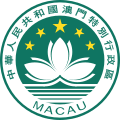 |
| Politics and government of Macau |
| Related topics |


The Government of the Macau Special Administrative Region allows citizens of specific countries/territories to travel to Macau for tourism or business purposes for periods ranging from 14 to 180 days without having to obtain a visa. [1] For other entry purposes, such as establishing residence on a long-term basis, a different policy applies.
Contents
- Visa policy map
- Unrestricted stay
- Visa exemption
- Entry procedures for Chinese nationals not residing in Macau
- Entry procedures for visa nationals
- Entry refusal
- Extending short stays in Macau
- Transit
- Long stay
- Special Authorization to Stay for Non-resident Students
- Residence
- Visitor statistics
- See also
- References
- External links
The Serviço de Migração (Immigration Department), under the Public Security Police Force, is the government agency responsible for immigration matters, whilst the Public Security Police Force itself is responsible for enforcing immigration laws in Macau. [2]
All visitors must hold a passport, travel document and any other documents accepted for the purpose of immigration control valid for 90 days beyond the period of intended stay in Macau.
Under the one country, two systems policy, Macau maintains its immigration and visa policy independently from the rest of China. Consequently, entering Macau from mainland China or Hong Kong requires passing through immigration checkpoints of mainland China or Hong Kong. Whilst Hong Kong residents have visa-free access for short visits to Macau, mainland residents must obtain a Two-way Permit (EEP) with the appropriate exit endorsement from the Chinese Ministry of Public Security before visiting Macau.




